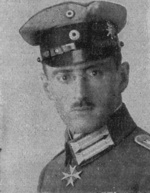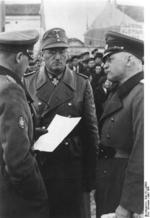Ferdinand Schörner
| Surname | Schörner |
| Given Name | Ferdinand |
| Born | 12 Jun 1892 |
| Died | 2 Jul 1973 |
| Country | Germany |
| Category | Military-Ground |
| Gender | Male |
Contributor: C. Peter Chen
ww2dbaseFerdinand Schörner was born in München (English: Munich), Germany in 1892. He participated in WW2 as a junior officer and had won the Pour le Mérite award for bravery in the 1917 Battle of Caporetto. During the inter-war years, he remained in the German Army. He commanded the 98th Mountain Regiment during the Invasion of Poland in Sep 1939, then commanded the 6th Mountain Division during the German campaign in the Balkan Peninsula in 1941; for his role in breaching the Greek Metaxas Line, he was awarded the Knight's Cross award. Again with the 6th Mountain Division, he participated in the invasion of Soviet Union. In Jan 1942, he was promoted to the rank of general of mountain troops (General der Gebirgstruppe) and was given command of XIX Mountain Corps. In this role, he participated in the failed attack on Murmansk, Russia. Between Nov 1943 and Jan 1944, he led XXXX Panzer Corps. In Mar 1944, he was made the commanding officer of Army Group A. In May 1944, he was made the commanding officer of Army Group South Ukraine; while in this role, the port city of Sevastopol on the Krym (English: Crimea) peninsula was lost. In Apr 1944, he was promoted to the rank of colonel general (Generaloberst). In Jul 1944, he was made the commanding officer of Army Group North (later Army Group Courland). In Jan 1945, he was made the commanding officer of Army Group Center. In this role, he gave the harsh order that all soldiers not fighting on the front lines without explicit written orders would be hanged. In Apr 1945, he was promoted to the rank of field marshal. Later in the same month, he was made the Commander-in-Chief of the German Army according to the last testament of Adolf Hitler. Unwilling to surrender to the Soviets, he led a small formation fighting through Soviet lines toward Czechoslovakia. He abandoned his position in mid-May and, in civilian clothes after having destroyed his uniform, surrendered to the Americans in Austria on 18 May 1945. In Aug 1951, he was arrested by the Soviet authorities on charges of war crimes. In Feb 1952, the Military Board of the Soviet Supreme Court sentenced him to a 25-year prison term, but two months later it was reduced by the Presidium of the Supreme Soviet to 12.5 years. In Dec 1954, he was turned over to East Germany. In 1958, he was released from East German captivity. As he traveled to West Germany, he was once again arrested, this time by West German authorities, for his 1945 orders that led to the death of many uniformed Germans who were caught behind the front lines, resulting in them being killed by their own countrymen. Schörner was found guilty and was given a 4.5-year prison sentence. He served the sentence between 1959 and 1964. Upon his release, he lived in his hometown of München and was the last German field marshal to passed away in 1973.
ww2dbaseSource: Wikipedia
Last Major Revision: Jul 2018
Ferdinand Schörner Interactive Map
Photographs
 |  |  |  |
Ferdinand Schörner Timeline
| 12 Jun 1892 | Ferdinand Schörner was born in München, Kingdom of Bayern, Germany. |
| 22 Dec 1914 | Ferdinand Schörner was awarded the Iron Cross 2nd class. |
| 20 Apr 1916 | Ferdinand Schörner was awarded the Military Merit Cross 3rd class of Austria-Hungary. |
| 27 Jan 1917 | Ferdinand Schörner was awarded the Iron Cross 1st class. |
| 24 Oct 1917 | Ferdinand Schörner was awarded the Military Merit Order of Bayern. |
| 5 Dec 1917 | Ferdinand Schörner was awarded the Pour le Mérite medal. |
| 12 Sep 1939 | Ferdinand Schörner was awarded Iron Cross 2nd class. |
| 20 Sep 1939 | Ferdinand Schörner was awarded Iron Cross 1st class. |
| 20 Apr 1941 | Ferdinand Schörner was awarded the Knight's Cross the Iron Cross medal. |
| 1 Jul 1942 | Ferdinand Schörner was awarded the Order of the Cross of Liberty 1st class of Finland. |
| 20 Aug 1942 | Ferdinand Schörner was awarded the Eastern Front medal. |
| 30 Jan 1943 | Ferdinand Schörner was awarded the Golden Party Badge of the Nazi Party. |
| 17 Feb 1944 | Ferdinand Schörner was awarded oak leaves to his Knight's Cross the Iron Cross medal. |
| 28 Aug 1944 | Ferdinand Schörner was awarded swords to his Knight's Cross the Iron Cross medal. |
| 1 Jan 1945 | Ferdinand Schörner was awarded diamonds to his Knight's Cross the Iron Cross medal. |
| 4 Apr 1945 | Ferdinand Schörner was promoted to the rank of field marshal. |
| 30 Apr 1945 | Ferdinand Schörner was made the Commander-in-Chief of the German Army. |
| 2 May 1945 | Ferdinand Schörner reported to Alfred Jodl that he was leading a group of troops fighting through Soviet lines so he could surrender to the Americans. |
| 8 May 1945 | Ferdinand Schörner effectively lost his position as the Commander-in-Chief of the German Army as Germany surrendered, but he continued to led his men to fight Soviet forces toward American controlled areas. |
| 18 May 1945 | Ferdinand Schörner surrendered to the Americans in Austria. |
| 2 Jul 1973 | Ferdinand Schörner passed away in München, Germany. |
Please consider supporting us on Patreon. Even $1 per month will go a long way! Thank you. Please help us spread the word: Stay updated with WW2DB: |
Visitor Submitted Comments
All visitor submitted comments are opinions of those making the submissions and do not reflect views of WW2DB.

» Invasion of Poland
» Balkans Campaign
» Operation Barbarossa
» Operation Silver Fox
» Silesian Offensive and the Siege of Breslau
- » 1,182 biographies
- » 337 events
- » 45,115 timeline entries
- » 1,248 ships
- » 350 aircraft models
- » 207 vehicle models
- » 376 weapon models
- » 123 historical documents
- » 261 facilities
- » 470 book reviews
- » 28,414 photos
- » 365 maps
Joachim von Ribbentrop, German Foreign Minister, Aug 1939
Please consider supporting us on Patreon. Even $1 a month will go a long way. Thank you!
Or, please support us by purchasing some WW2DB merchandise at TeeSpring, Thank you!
24 Jul 2018 10:15:09 AM
He was awarded the Pour Le Merite as a junior officer in WWI, not WW@.